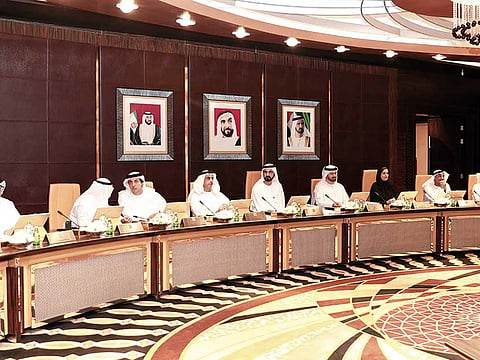Cabinet approves Government Communication Strategy
Supporting objectives of National Agenda and UAE Vision 2021 among 5 objectives and priorities set out for government communication

Abu Dhabi: The UAE Cabinet adopted the Government Communication Strategy 2017-2021 on Sunday.
The strategy includes a set of strategic objectives and national priorities to achieve optimal communication mechanisms and promote an integrated government communication system for federal entities.
The strategy was approved during a Cabinet meeting at the Presidential Palace chaired by His Highness Shaikh Mohammad Bin Rashid Al Maktoum, Vice-President and Prime Minister of the UAE and Ruler of Dubai.
Lieutenant General Shaikh Saif Bin Zayed Al Nahyan, Deputy Prime Minister and Minister of Interior, and Shaikh Mansour Bin Zayed Al Nahyan, Deputy Prime Minister and Minister of Presidential Affairs, attended the meeting.
Shaikh Mohammad drew attention to fast-changing global scenarios and people’s priorities saying that they called for greater flexibility in dealing with ever-changing paradigms. “Government communication is an important component of the decision-making process, and our vision is to achieve the most innovative and influential government communication by 2021,” Shaikh Mohammad said.
“The UAE has been attracting global attention for its innovative services and initiatives, and government communication is one of the pillars to connect with local and global audience,” Shaikh Mohammad added.
Shaikh Mohammad emphasised that the Government Communication Strategy, in its third edition, will focus on priorities and objectives that support the vision of the UAE 2021 and will adopt innovative ideas and initiatives to further advance the two-way communication channel between the Government and society, which will enhance overall government performance. “Government entities, the private sector, media outlets, the general public, as well as social media users, all contribute to the success of the five-year communications strategy,” he explained.
Five objectives and priorities for government communication were identified until 2021, which include supporting the objectives of the National Agenda and the UAE Vision 2021, enhancing communication coordination between the government and all sectors, leading an innovative and effective management of the government’s image on various communication platforms, instilling patriotic values, and enhancing ties with media outlets.
The Cabinet also approved the restructuring of the UAE Soft Power Council under the chairmanship of Shaikh Mansour, while also approving memberships of ministers and officials in federal and local government departments in the UAE.
The council will be responsible for outlining general policy and strategy on soft power in addition to defining the main objectives and proposing pertinent legislation, policies and initiatives in order to strengthen the UAE’s soft power regionally and internationally.
The Cabinet also approved the project for developing the Continuing Education Centres, in line with the framework for providing different education opportunities and diversifying the continuing education programme.
As for international relations, the Cabinet ratified tax avoidance agreements with Antigua, Barbuda, Ethiopia, Ecuador and Paraguay, in addition to mutual investment protection agreements with Antigua, Barbuda and Ethiopia. The Cabinet also ratified aviation services agreements with Brazil, Cape Verde, Liberia, Bhutan and Guinea.
Soft Power Council members
Mohammad Abdullah Al Gergawi, Minister of Cabinet Affairs and the Future
Dr Anwar Mohammad Gargash, Minister of State for Foreign Affairs
Reem Ebrahim Al Hashemi, Minister of State for International Cooperation
Dr Sultan Ahmad Al Jaber, Minister of State
Noora Mohammad Al Kaabi, Minister of Federal National Council Affairs
Khaldoun Khalifa Al Mubarak, Chairman of the Executive Affairs Authority and Managing Director and Group CEO of Mubadala
Mohammad Khalifa Al Mubarak, Chairman of Abu Dhabi Tourism and Culture Authority
Khalifa Salem Al Mansouri, Acting Undersecretary at Abu Dhabi’s Department of Economic Development
Sami Ahmad Dhaen Al Qamzi, Director-General of Dubai’s Department of Economic Development
Hilal Saeed Al Merri, Director-General of Dubai’s Department of Tourism and Commerce Marketing
Ali Al Neyadi, Director of the Office of the National Security Adviser
Saeed Mohammad Al Ater, Director-General of the Office of General Diplomacy at the Ministry of Cabinet Affairs and the Future, will serve as Secretary-General of the Soft Power Council



